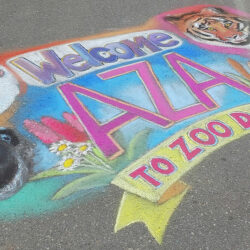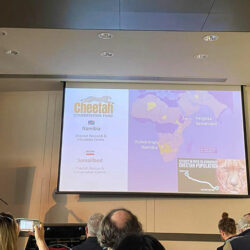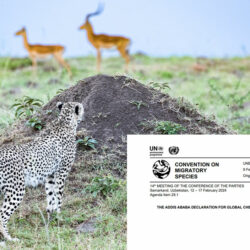Horn of Africa Tour – Ethiopia and Somaliland
-

- by Patricia Tricorache March 27, 2018
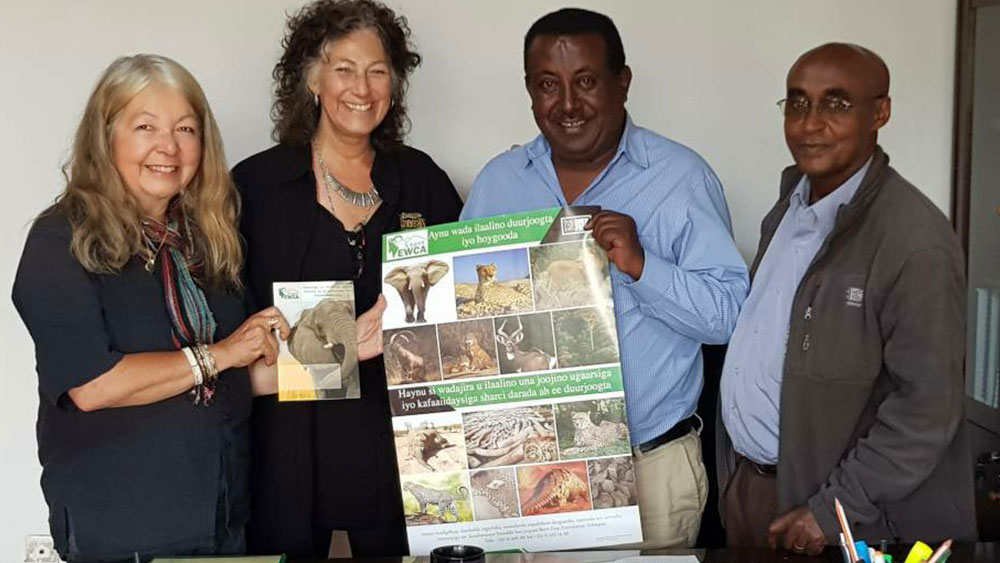
When the US State Department’s Regional Environmental Officers in Ethiopia mentioned the possibility of holding a World Wildlife Day event in Jijiga, a hot spot for cheetah trafficking in eastern Ethiopia, I thought that would be a precious opportunity to visit that difficult area and try to network with the local authorities. Dr. Laurie Marker was in the conference call, and after we hung up, we discussed what a perfect opportunity it would be for her to visit the region and together take a good look at the current situation regarding illegal cheetah trade. I was thrilled when we looked at her calendar and realized that she was available for a week before her commitments in the US began. We decided that it would be worth visiting not only Ethiopia, but Somaliland, the main transit route for cheetah trafficking towards the Arabian Peninsula.
I had been to Somaliland a couple of times before, always working very closely with our associates there and with the Ministry of Environment and Rural Development. The Minister, Hon. Shukri Ismael, welcomed us warmly as always, and reassured us that her Ministry was committed to end wildlife trafficking. However, she reiterated the issues facing Somaliland as it struggles with non-recognition by the international community as an independent nation. Its status as an autonomous region makes it difficult for the government to obtain support from most countries. Consequently, NGOs such as CCF and our partners also face tremendous challenges to obtain funding, which is much needed for building capacity for enforcement and veterinarians, as well as for the care of animals confiscated from the trade.
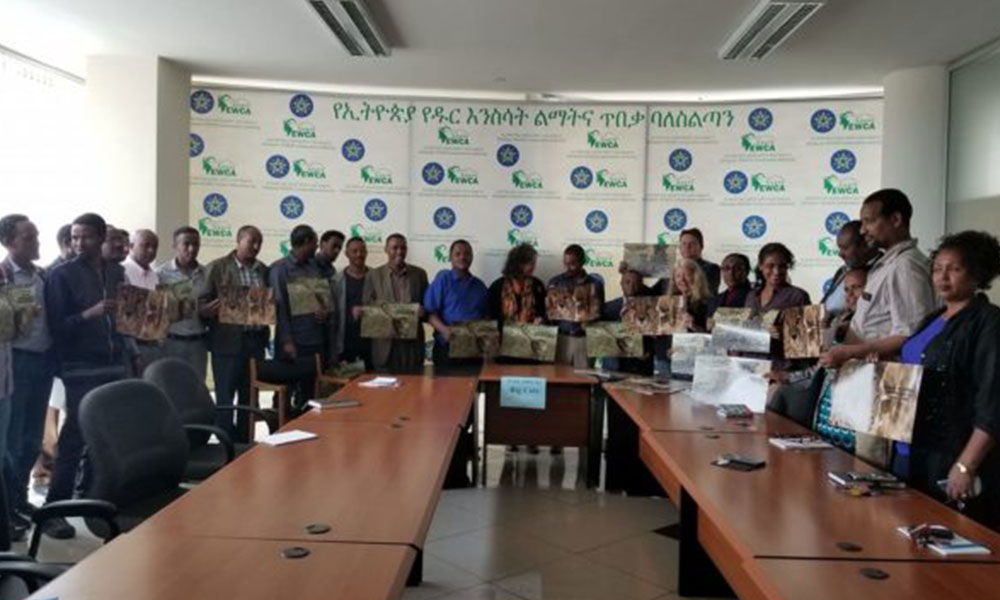
Every day during our visit, Minister Shukri made time to meet with us and brainstorm regarding enforcement, awareness and confiscated animals, all of which are part of strategies and agreements we’ve made over the last year to fight illegal wildlife trade. And on our last day in Somaliland, we also met with several Ministry officials, including two wildlife officers we had recently welcomed at CCF in Namibia for training.
The Minister graciously accepted our invitation to meet two of the cheetah cubs currently under our associates’ care in Hargeisa: Dhoobi and Veepi. These cubs, now 10 months’ old and a year-old respectively, were surrendered to us last July. Since then, they have lived in a rented house with round-the-clock care, thanks to the support of our partner, the International Fund for Animal Welfare (IFAW). While this location is not ideal for the cubs, it is secured and provides the cubs with ample room to run and play. Dhoobi, the younger of the two, is a bit too playful, which could become an issue as he grows bigger. Consequently, Dr Marker gave Neju, our cheetah caretaker, some valuable hints to socialize him and manage him since he is hand raised and tame, but very playful. We also made some improvements to the cubs’ play yard by adding some wooden crates where they can climb and play. We were both very pleased to watch the cubs enjoying their new play area, especially Veepi, who came to us with severe leg deformities due to Metabolic Bone Disease, or MBD, a disease caused by a calcium deficiency. This is commonly found on pet cheetahs when the owners don’t know how to feed these delicate animals properly. Since Veepi came to us, he has been subject to a very strict diet, which includes calcium and vitamin supplements. And while MBD is incurable, his legs have straightened enough to give him the ability to run and play, even though he does so quite daintily.
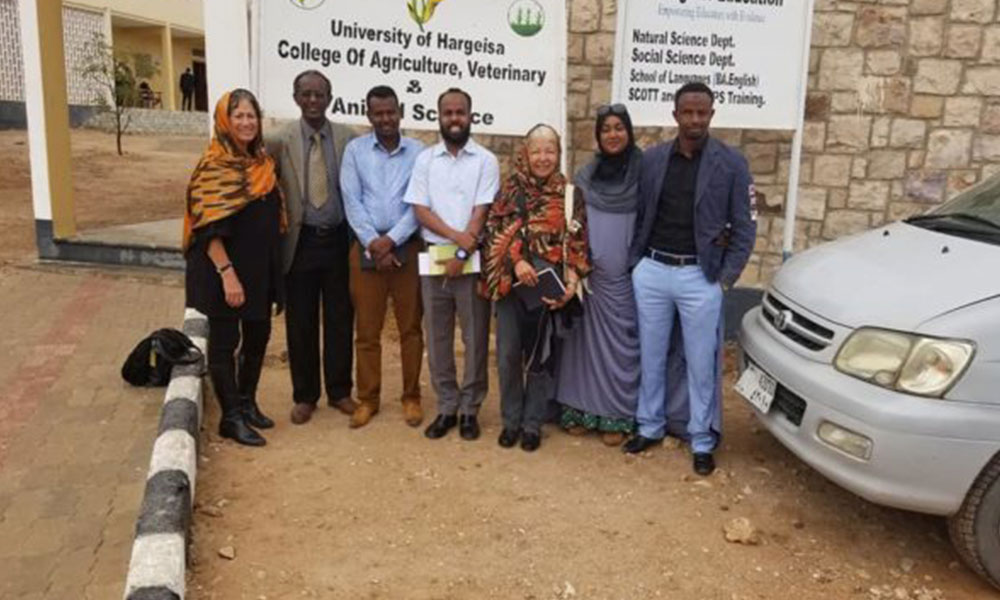
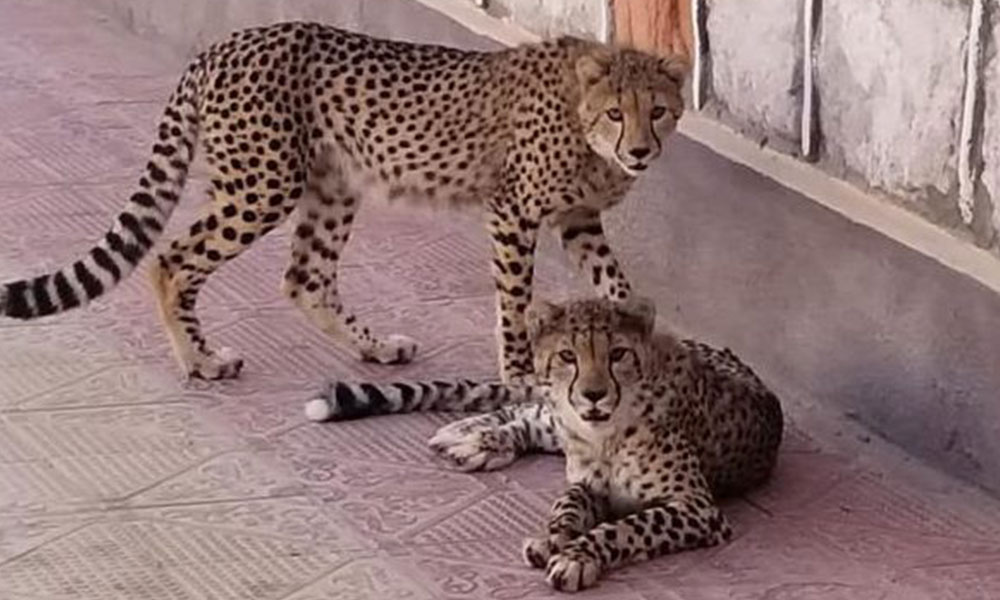
Another very positive outcome of our visit was the opportunity to meet with the Dean of the Veterinary College of Agriculture, Veterinary and Animal Science at University of Hargeisa to find ways in which we can collaborate to provide veterinary care to confiscated wildlife. Our animal caretaker Neju, who is a 4th-year student there, introduced us. We returned to the University a second time on our last day in Somaliland to meet with more Faculty members. Together we identified areas where immediate cooperation is possible, and those where training or sharing of information are needed. The veterinarians/lecturers all expressed their eagerness to do everything in their power to help when emergencies with animals arise. This includes the use of their laboratory, which offers some basic capabilities that can help us identify certain diseases in cheetahs or perform a few procedures. It was agreed that they could benefit from training in the treatment of wild animals, a possibility that we are already looking into, either by organizing a training at CCF in Namibia, or at a nearby facility such as the Refuge DECAN in Djibouti, where some of the confiscated cheetahs from Somaliland are housed.
On the same topic of trying to find every available option to address cheetah health issues, we met with several expats including physicians interested in our work in Somaliland. Human doctors could be of help when cheetah health problems arise, given the current lack of veterinarians trained in cheetahs and other small animals – an issue we are also seeking to address.
One important part of our activities in Somaliland is the development of a rescue center for confiscated animals. Laurie and I spent one morning visiting the site of a recently-built rescue center currently housing several gazelle species endemic to the region. The gazelles had been hoarded illegally by an animal collector. This center is phase 1 of a longer-term plan to house confiscated cheetahs, once the conditions are ripe, as this entails a large investment and specialized care.
As part of our awareness efforts, we contacted one of our new friends in Somaliland, who publishes the Somaliland Sun, a print and online newspaper in English. Our interview was published on several newspapers and aired on Somaliland national TV. We also met a member of the Somaliland diaspora residing in the UK, who is interested in helping raise awareness about illegal wildlife trade.
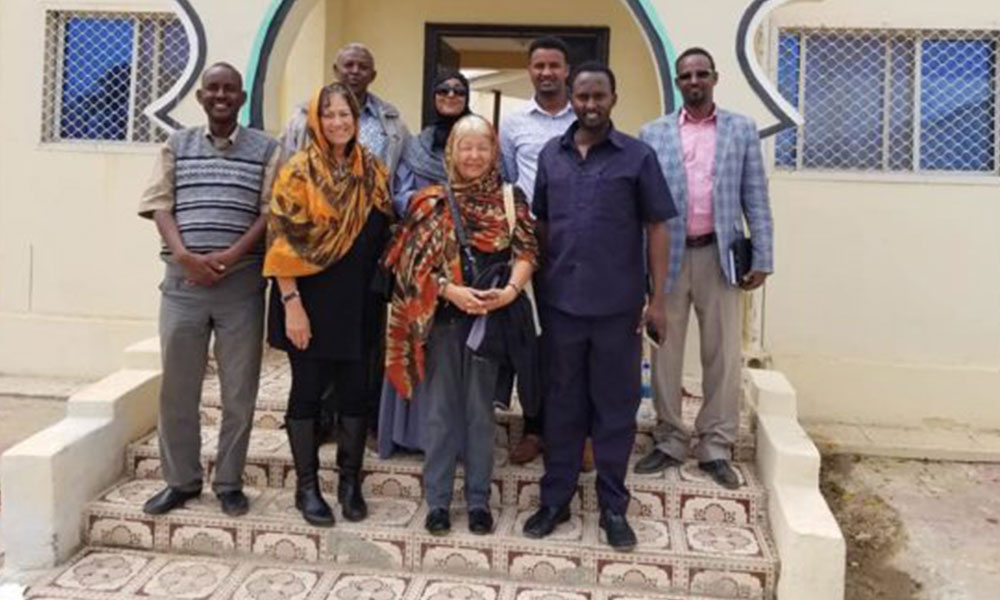
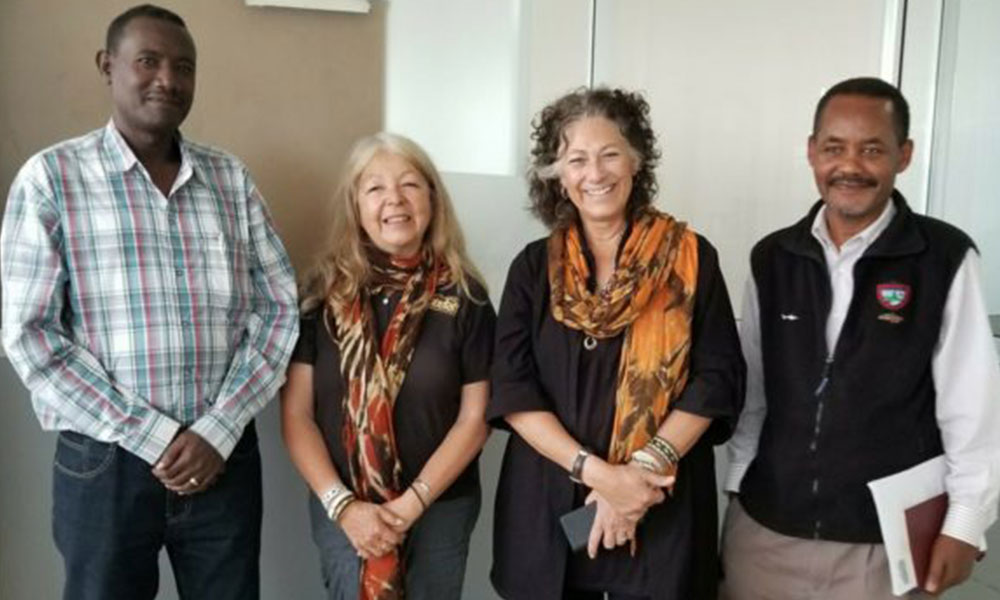
Laurie and I spent all our free time with our Somaliland team to discuss matters such as budget, bio-medical samples in storage, cheetah care and awareness efforts.
Working in Somaliland has its challenges, but we have the best team, and with them and our international partners we will continue to do everything possible to fight illegal wildlife trade and improve conditions for confiscated animals.
During our visit in Hargeisa we learned that the World Wildlife Day event in Ethiopia had been cancelled due to a state of emergency in the country. While this was disappointing, it is imperative to heed safety warnings. Instead, Laurie and I were invited to a World Wildlife Day ceremony held by the Ethiopian Wildlife Conservation Authority (EWCA) and representatives from the US Regional Environmental Office for East Africa based at the US Embassy in Ethiopia. At the ceremony, EWCA’s Director General, Kumira Waqjira, was presented with various posters produced by the Embassy in collaboration with CCF, in the Somali language. The posters, which feature photos of cheetahs, are intended to raise awareness about illegal cheetah trade in the Ethio-Somali region of Ethiopia.
Meeting Director Kumira was a true pleasure. He has been recently appointed to this position at EWCA, although he has spent his entire professional career at this institution. EWCA is the government entity in Ethiopia responsible for wildlife, and an important partner in efforts to fight illegal wildlife trade since we first began working on this issue in 2005.
Through our years working to conserve cheetahs we have forged many friendships, and one of them is also at EWCA: Daniel Pawlos, Director of Wildlife and Their Products. Daniel is a CCF alum as well, as he participated in CCF’s international training courses on Conservation Biology back in 2008. This was a great opportunity to discuss with him ways in which we can collaborate in Ethiopia and throughout the Horn of Africa. He then introduced us to EWCA’s Director of Wildlife Research and Monitoring, with whom we talked about our cheetah genetics database. This database can be crucial to support enforcement investigations into illegal cheetah trade.
Our partnerships with other NGOs are also very important, and during our short visit in Ethiopia we had a very productive meeting with the Born Free Foundation Ethiopia (BFFE) office. BFFE’s Director, Dr. Zelealem Tefera, was one of the first people to assist us when we first heard and organized the confiscation of two cheetah cubs being sold at a restaurant in Ethiopia in 2005.
A highlight of our visit in Ethiopia was having the honor of being invited by the Hon. Mary Beth Leonard, US Ambassador to the Africa Union. Amb. Leonard, who was posted in Namibia many years ago, has known Laurie since then, and when hearing that we were in Ethiopia, she hosted us for lunch at her residence. While this was a non-official function, it allowed us to begin a dialogue regarding many issues affecting the African continent and of concern to CCF.
After Laurie left for the US, I continued some of the discussions started with her, and then traveled to Djibouti to continue meetings with HAWEN, as well as with the Intergovernmental Authority on Development (IGAD), which is an eight-country trade bloc in Africa that includes governments from the Horn of Africa. During all these meetings, the central topic of discussion was cooperation; with CCF reiterating its commitment to working with the region at all levels to stop illegal wildlife trade.
In Djibouti I was a guest of Association DECAN. DECAN is an organization dedicated to conservation. It manages several protected areas in Djibouti. However, it started in 2003 as a wildlife refuge in 2003, and today it houses nearly 100 animals, including several of the cheetahs we helped rescue as small cubs in Somaliland. It is nice to see them in large spaces and helping educate people visiting the center, as they seem to enjoy approaching the fence and purr loudly when people come to visit.
Today is my last day in Djibouti, as I head back to Addis Ababa to a 3-day workshop on Geographic Information Standards (GIS) to Combat Wildlife Trafficking. organized by the US Department of State. We were thrilled at CCF when we learned that the workshop organizers selected the cheetah as one of two species for wildlife trafficking use cases, and I will be sharing our knowledge of cheetah trafficking and discussing ways in which GIS technology can be helpful to stop this trade. I look forward to reporting back on the outcomes of this workshop.
Related Reading
-
September 27, 2024
Representing the Cheetah at the AZA Conference -
February 19, 2024
The Addis Ababa Declaration for Global Cheetah Conservation

